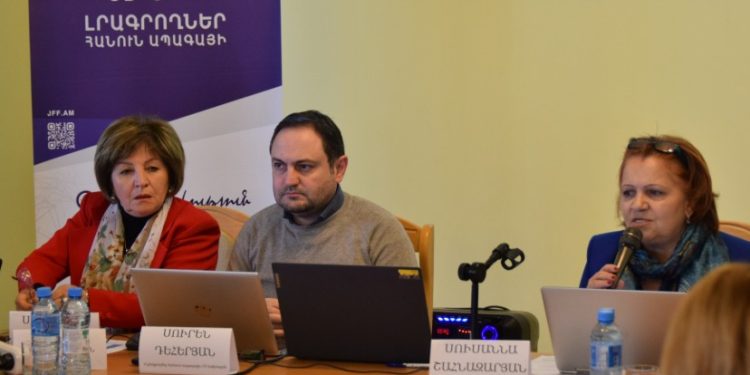Syunik Region has a Human-Centered Security Needs Assessment Document
“For the first time in Armenia, the security issue of Syunik has been moved from the political and media top field to the people who carry it, where there are no political speculations, no misinformation,” affirmed Susanna Shahnazaryan, President of “Goris Press Club” NGO, during the conference held in Goris.
The conference centered on presenting the preliminary results of the “Human Security in Syunik Region” sociological survey. The survey aimed to identify the needs of the residents of Syunik Marz communities concerning human security.

f:
Conducted within the framework of the “Improvement of Local Government Strategy in Syunik” aimed at crisis management and public protection” project, the initiative is a collaborative effort between “Journalists for the Future” NGO, Goris Press Club, and Kapan “Rainbow” Leadership Educational Center NGO.
The conference attracted attendees from Syunik Marzpetaran, local self-government bodies, civil society, and other interested parties.
Prior to unveiling the research results, approximately 60 participants delved into the significance of the interdependence of security and development in the context of human security.
Suren Deheryan, President of “Journalists for the Future” NGO, emphasized, “The pillars of human security are his three freedoms, the development of man and the environment around him, the protection of human rights, and the provision of a peaceful and safe life.” He stressed the need to address problems comprehensively to safeguard human security fully.
In further elaboration, Suren Deheryan underscored that individual threats to human security can arise from factors such as insufficient access to food or violations of personal religious beliefs. However, when multiple freedoms of an individual are concurrently jeopardized, a profound sense of insecurity may ensue, potentially leading to conflicts.
He emphasized the imperative for a comprehensive approach to address issues endangering human security. This approach not only involves identifying symptomatic concerns but also delving into the root causes of these problems.
To safeguard an individual’s well-being, attention must extend beyond physical safety, traditionally upheld by law enforcement, the military, or legal frameworks. The United Nations, recognizing the multifaceted nature of human security, has identified seven critical areas: food, economic, health, environmental, personal, political, and community.
Researcher and sociologist Arevik Hambardzumyan presented qualitative results, indicating distinctive socio-economic and security landscapes across the eight enlarged communities in the region. The aftermath of the epidemic and the 44-day war unveiled vital concerns in agriculture, employment, education, security, and other pivotal areas for the population of Syunik.
Acknowledging the current challenges, a human-centered security needs assessment was conducted as part of the research, offering valuable insights into people’s perceptions of existing risks and threats.
Participants in the discussion provided their observations on the research. Deputy head of the local community, Aram Mirzoyan, highlighted the importance of not only presenting the situation but also developing a roadmap of solutions. This roadmap aims to ensure the safety of individuals, reflecting a commitment to proactive measures for a secure community.
These insights and recommendations from the participants will be incorporated into the ongoing research, further enhancing its comprehensiveness and value. The commitment is to utilize the research findings to formulate an effective management concept for Syunik communities, ensuring a people-centered approach with interconnected solutions for socio-economic development and community security.
Karen Lazaryan, a member of the council of elders of Goris community, drew attention to the challenges within the education sector, intricately linked to the prevailing security situation. This acknowledgment underscores the importance of addressing educational needs as a crucial component of community security.
“In the future, this document can evolve into a representation of public opinion, serving as a foundation for the formulation of future strategic goals within our communities. Furthermore, it can play a pivotal role in attracting international investments to bolster community development,” remarked Irina Yolyan, a dedicated member of the Goris Community Council.
The valuable observations and constructive suggestions put forth by the participants during the event will be seamlessly integrated into the ongoing research. This inclusive approach aims to enhance the research’s comprehensiveness and its intrinsic value as a guiding document.
Drawing upon the insights garnered from the research, a comprehensive concept for the effective management of Syunik communities is in the process of development. Noted lawyer Tatevik Tokhyan emphasized that this management concept will adopt a people-centered approach, offering interconnected solutions for socio-economic development and the security of communities.
The commitment is to utilize these collaborative efforts to create a robust framework that addresses the multifaceted challenges faced by Syunik communities, ultimately fostering a secure, prosperous, and resilient environment for all residents. This initiative aligns with our collective dedication to ensuring the well-being and sustainable development of the region.
***
This project is implemented within the framework of the “Data for Accountabe and Transparent Action” (DATA) program with the support of the US Agency for International Development. The contents are the sole responsibility of “Goris Press Club” NGO and do not necessarily reflect the views of USAID or the United States Government.
